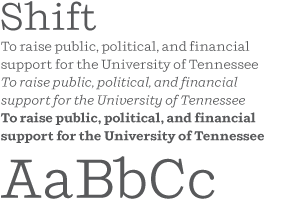Brand Guidelines
Mission, Vision, Objectives
The University of Tennessee Foundation, Inc. is an interdependent nonprofit corporation established in 2001 to support the University of Tennessee System’s education, research and outreach activities. As the preferred channel for all private contributions that benefit students and faculty within the UT System, maintaining a mission-focused, transparent and consistent identity breathes life into our mission and establishes trust with our alumni, donors and friends.
Through our affiliation agreement with the University of Tennessee, UTFI is permitted to use the University name, nicknames and logos in pursuit of our mission. Within the parameters of that permission, all correspondence, solicitations, activities and advertisements concerning the Foundation shall be clearly discernible as being from the Foundation and not the University.
UT Foundation staff, and any third-party utilizing UTFI logo, must adhere to our brand guidelines to maintain compliance with this agreement.
Mission
To raise financial, public and political support for the University of Tennessee.
Vision
To be recognized as one of the top performing advancement organizations affiliated with any university system in higher education.
Objectives
Three objectives are at the core of this vision:
- Enhance philanthropic support for the University of Tennessee System and its core institutional priorities.
- Expand constituent engagement by developing meaningful relationships with University of Tennessee alumni, students and friends.
- Build and protect the UT brand dedicated to the mission of Discovery, Education and Connection.
Contact the UTFI Office of Communications
Jackie Wise
Senior Director of Communications
(865) 974-2575
[email protected]
Alexa Goddard
Assistant Director of Communications
(865) 974-5519
[email protected]
Terry Johnson
Communications Coordinator
(865) 974-3324
[email protected]
Visual Style Guidelines
Colors
Primary Colors
Color is one of the most recognizable aspects of our brand identity. By longstanding tradition, orange is the color most generally associated with UT and serves as a primary color within UTFI’s color palette. Additional colors within the palette work well as backgrounds and design elements.
UT System Orange
PMS 151
CMYK 0/55/100/0
RGB 255/130/0
HEX #FF8200
UT System Gray
PMS Cool Gray 11
CMYK 0/0/0/85
RGB 75/75/75
HEX #4B4B4B
UT System Black
PMS Black C
CMYK 0/0/0/100
RGB 0/0/0
HEX #000000
UT System White
PMS NA
CMYK 0/0/0/0
RGB 255/255/255
HEX #FFFFFF
Secondary Colors (Campus Colors)
The following colors are preferred when representing the five campuses of the UT System.
Orange
UT Knoxville
PMS 151
CMYK 0/55/100/0
RGB 255/130/0
HEX #FF8200
Gold
UT Chattanooga
PMS 124
CMYK 0/31/90/0
RGB 253/183/54
HEX #FDB736
Red
UT Southern
PMS 186
CMYK 0/92/77/22
RGB 200/16/46
HEX #C8102E
Navy
UT Martin
PMS 289
CMYK 100/66/0/76
RGB 11/35/65
HEX #0B2341
Green
UT Health Science Center
PMS 343
CMYK 89/19/72/60
RGB 17/87/64
HEX #115740
Accent Colors
Continuing to tell the richness and complexity of our story, the UT Foundation has adopted deeply saturated hues to add depth and richness to visual communications. These accent colors should be used sparingly and should complement the overall design.
Teal
PMS 7713
CMYK 100/33/42/7
RGB 0/123/137
HEX #007B89
Citrine
PMS 16-0952
CMYK 12/43/100/13
RGB 197/137/33
HEX #C58921
Jade
PMS 18-6216
CMYK 69/40/67/21
RGB 82/111/90
HEX #526F5A
Amethyst
PMS 19-2009
CMYK 64/74/43/29
RGB 90/68/90
HEX #5A445A
Rubellite
PMS 19-2045 TCX
CMYK 2/100/19/46
RGB 144/0/73
HEX #900049
Color Distribution
The orange and gray are the primary colors of the UT Foundation and are recognizable for our brand and the UT System. It is recommended that the UT orange make up at least 10 percent of the visual design.
Campus colors should be used proportionally if they are serving as a campus representation. UTFI accent colors should never represent more than 20 percent of the visual design, given their deeply saturated hues.
UT Orange = Always at least 10%
Accent Colors = Never more than 20%
Colors shown here: 10% System Orange, 15% System Gray, 55% System White, 15% Accent Teal (at 60%), and 5% Accent Jade.
UT Orange = Always at least 10%
Accent Colors = Never more than 20%
Colors shown here: 20% System Orange, 45% System White, 39% Campus Navy, and 1% Accent Rubellite.
UT Orange = Always at least 10%
Accent Colors = Never more than 20%
Colors shown here: 5% System Orange, 10% System Gray, 60% System White, 25% Campus Colors (each at 5%).
Logos & Graphic Elements
Primary Logo
The UT Foundation primary logo creates visual recognition of the organization and serves as the baseline of our identity. The use of the icon helps leverage our connection with the University of Tennessee, while the Foundation identifier maintains our separation as an organization.
As such, the primary logo is the preferred visual representation of the UT Foundation and should be used whenever possible. The primary logo should never be altered. Never crop, rotate, recolor or stretch the logo.



Campus Identifiers
Within the suite of logos, each campus and institute have the option to utilize the primary logo with an identifier.
The identifier should only be used in instances where the campus or institute is not obvious, and can be used in orange or gray.
For example, an annual giving appeal that utilizes campus marks, colors and photography would use the UTFI primary logo without the identifier. Letterhead or notecards utilizing one logo and limited visual elements could use the identifier to provide their campus or institute affiliation.






Departmental Identifiers
At times, it is necessary to identify departments within the Foundation. Departmental logos are intended for internal use within UTFI only. Any external communications, including the UT System communities, should use the primary logo.
The visual elements of departmental logos are specifically configured, placed, sized and rendered in a precise relationship. These logos should not be altered, nor should departmental logos be created outside of the UTFI Office of Communications.


Logo Extensions
To help manage a visual identity, our core brand is the UTFI primary logo and should be used on the vast majority of communications. Within the Foundation we have core brand extension through programs that advance our mission and align closely with our core brand.
A brand extension may include a program with collaboration throughout multiple campuses and institutes, a high degree of collaboration with external stakeholders, a limited duration project or initiative or a priority that requires flexibility in design and a distinct identity.
Graphic identities for these programs must align with the UT Foundation brand and be approved through the UTFI Office of Communications.



Graphic Elements
Capturing the brilliance of our alumni, donors and friends, the Foundation ensures that their talents and treasure are used to reveal the true potential for the future of the University of Tennessee.
Telling our story visually incorporates this notion through the geometric facets of a gemstone. The facets add distinction, significance and value by allowing the unique beauty to shine.
When incorporating elements, angular or geometric figures are preferred. Following a principle of simple elegance, our textures are understated. The facets can be used by adding linear elements over a solid color or by using a variety of shades to produce a prismatic effect.


A handful of faceted gemstones have been developed for unique usage and can be used sparingly throughout communications. For example, these graphic elements can be used in part or whole to add character in bullet points, as a watermark within solid areas of color or to enhance the visual flow of the publication.





Typography
Primary Fonts
In maintaining affiliation with the University of Tennessee, our primary typefaces are Gotham and Goudy Old Style. Both typefaces are used on all UT campuses and institutes.
Gotham
Gotham is a sans serif typeface designed by Tobias Frere-Jones and released in 2000 through H&FJ (now known as Hoefler & Co.)
Gotham
To raise public, political, and financial support for the University of Tennessee
To raise public, political, and financial support for the University of Tennessee
To raise public, political, and financial support for the University of Tennessee
AaBbCc
Goudy Old Style
Goudy Old Style is a serif typeface designed by Frederic Goudy and released through American Type Founders in 1915.
Goudy Old Style
To raise public, political, and financial support for the University of Tennessee
To raise public, political, and financial support for the University of Tennessee
To raise public, political, and financial support for the University of Tennessee
AaBbCc
Accent Fonts
Accent fonts can add dynamic emphasis within communications. The following two fonts are specific to UT Foundation and may be used sparingly in communications.
Tenez
Tenez is a serif typeface that helps communicate professionalism, formality and sophistication. This typeface can create an elegant impact through the contrast of the thin strokes and the black areas left by the serifs.
Tenez
To raise public, political, and financial support for the University of Tennessee
To raise public, political, and financial support for the University of Tennessee
To raise public, political, and financial support for the University of Tennessee
AaBbCc
Alisha
Alisha a modern free-hand script that conveys elegance, while also providing an inviting touch to communications. When used sparingly as an accent, this font creates a distinct first impression, fostering the initial engagement.
Alisha
To raise public, political, and financial support for the University of TennesseeTo raise public, political, and financial support for the University of Tennessee
To raise public, political, and financial support for the University of Tennessee
AaBbCc
Contact the UTFI Office of Communications
Jackie Wise
Senior Director of Communications
(865) 974-2575
[email protected]
Alexa Goddard
Assistant Director of Communications
(865) 974-5519
[email protected]
Terry Johnson
Communications Coordinator
(865) 974-3324
[email protected]
Writing Guide
Writing Style
UTFI Uses Associated Press Style (AP Style)
Maintaining consistency in our communications through editorial style ensures a positive image of the Foundation.
This writing style guide is a resource for preparing written material for distribution to or publication by the media, on the UT Foundation website, within internal email to employees, and other official communication on behalf of the UT Foundation.
It is intended to ensure consistent and correct usage of titles and acronyms in reference to UTFI and UT campuses, institutes, offices, facilities and their leaders.
Generally, this guide follows Associated Press style, particularly for spelling, capitalization, abbreviations, and the like. Additional guidelines have been prepared for the UT Foundation offices or titles not specifically addressed in AP style.
In the interest of supporting the Foundation as a whole, communications should follow these guidelines. Campus departments within UTFI may use their campus editorial style when creating communications for their audiences. UTFI Office of Communications is available to help review and edit material and help with style consistency.
Internal and external communications representing the system-wide UT Foundation must go through the UTFI Office of Communications. If you have questions or suggestions for the Writing Guide, please email [email protected].
Foundation Style
Usage of Our Name
University of Tennessee Foundation, Inc. is the formal name of the statewide organization, and is always used as the first reference in all external communications.
On second reference, UT Foundation (capitalized as shown) should be used.
Subsequent reference may use “the Foundation” or UTFI (both capitalized as shown).
Usage of UT Foundation Board of Directors and Committees
Used as a proper name, UT Foundation Board of Directors and UTFI Board are capitalized, as are committee names, such as Directorship committee. The word committee is not capitalized.
The following capitalizations are used in reference to titles of members of the board:
Director Kimberly Cross
Chair Ron Freison
Audit and Compliance Committee Chair Fred Decosimo
When not in reference to a specific person, capitalizations are not used:
The chair called the meeting to order.
Each new director completes an orientation session.
System and Campuses
Referring to the University
University of Tennessee is the administrative/governing body for the statewide University of Tennessee system. On second and subsequent reference, UT System (capitalized as shown). The UT System may be referred to as “the University” on second or subsequent mention and, if so, University must be capitalized.
UT System is the statewide collective. The campuses, institutes, divisions, offices, properties and facilities statewide that make up the University as a whole.
Campuses / Institutes / Entities
University of Tennessee, Knoxville
UT Knoxville or UTK
University of Tennessee at Chattanooga
UT Chattanooga or UTC
University of Tennessee Southern
UT Southern or UTS
University of Tennessee at Martin
UT Martin or UTM
University of Tennessee Health Science Center
UT Health Science Center or UTHSC
University of Tennessee Institute of Agriculture
UT Institute of Agriculture or UTIA
University of Tennessee Institute for Public Service
UT Institute for Public Service or IPS
University of Tennessee Space Institute
UT Space Institute or UTSI
University of Tennessee Alumni Association
UT Alumni Association or UTAA
University of Tennessee Research Foundation
UT Research Foundation or UTRF
University of Tennessee Research Park at Cherokee Farm
UT Research Park or UTRP
College Names within the University
Make uppercase the word College when used as part of the proper name of a college; lowercase otherwise.
For example:
Joe was accepted into the UT College of Veterinary Medicine.
Academic advisers help students choose appropriate college courses.
Titles of Departments
On first reference, use the full name of a department or administrative area, and capitalize all words except prepositions. On second and subsequent reference, when only a partial name is used, make words lowercase.
For example:
UT Foundation Human Resources is conducting the executive search.
Human resources will contact prospective candidates.
Staff Titles
The table below lists the official names of the UT Foundation offices and senior staff titles.
| Office Name | Senior Staff Title(s) |
| Office of the President | University of Tennessee Foundation President Kerry Witcher |
| Office of Business | Treasurer and Chief Financial Officer |
| Office of Planned Giving | Assistant Vice President Planned Giving |
| UT Alumni Association | Assistant Vice President Alumni Affairs and Advocacy |
| Office of Advancement Services | Assistant Vice President Advancement Services |
| Office of Communications | Senior Director of Communications |
| Chattanooga | Vice Chancellor and Executive Director of the UC Foundation |
| Health Science Center | Vice Chancellor for Development and Alumni Affairs |
| Institute of Agriculture | Vice Chancellor for Institutional Advancement |
| Knoxville | Vice Chancellor for Advancement |
| Martin | Vice Chancellor for University Advancement |
| Southern | Vice Chancellor for Advancement |
Events, Seasons, Holidays, Alum/Alumni, Doctor
Homecoming
Capitalize in reference to a specific, named campus event: UT Chattanooga Homecoming 2021.
Make lowercase in general use: Anne looked forward to the family’s homecoming.
Seasons, Semesters, Holidays
The four seasons are not capitalized.
Semesters are not capitalized: fall semester, spring break, summer session.
Religious holidays are capitalized, as are most secular holidays.
Alum/Alumni/Alumnus/Alumna
Alumni: plural male graduates and plural gender neutral graduates
Alumnus: usually single male graduate, less often single female graduate
Alumna: single female graduate
Alumnae: plural female graduates
Alum: single graduate, gender neutral
Alums: plural graduates, gender neutral
Doctor/Dr.
Within body copy on websites, emails and press releases, the abbreviation Dr. is used only before the name of a person who holds a medical (MD or DVM) degree. Use Dr. in first reference as a formal title before the name of an individual who holds a doctor of dental surgery, doctor of medicine, doctor of optometry, doctor of osteopathic medicine, doctor of podiatric medicine or doctor of veterinary medicine.
The form Dr., or Drs., in a plural construction, applies to all first-reference uses before a name, including direct quotations. Do not continue the use of Dr. in subsequent references.
Do not use Dr. before the names of individuals who hold other types of doctoral degrees. Instead, when necessary or appropriate for a specific audience: Andrew Hicks, who has a doctorate in chemistry, was lead researcher. In a list: Andrew Hicks, Ph.D.
Numbers
Words or Numerals
Generally, use words in reference to numbers one through nine, and numerals in reference to numbers 10 and above.
For example:
All four sessions were attended by at least 15 people.
Three finalists were chosen from the pool of 52 candidates.
Numerals are always used to refer to time of day, dates, ages, percentages—with “percent” always spelled out, not indicated by the percent sign:
For example:
Classes for children 6 and older begin at 8 am on May 10.
Tuition is not expected to increase more than 3 percent.
If the specific age is used as an adjective or as a substitute for a noun, it should be hyphenated. Don’t use apostrophes when describing an age range.
For example:
The student is 21 years old.
The contest is for 18-year-olds.
The girl, 8, has a brother, 11.
He is in his 20s.
Ordinal Numbers
Generally, the same guidelines for numbers apply to ordinal numbers. Use words to refer to ordinal numbers first through ninth, and numeral versions of ordinal numbers 10th and above.
For example:
He graduated first in his class, while his twin brother graduated 20th.
All of the children in fifth grade were mentored by students in 10th grade.
Note: Word processing programs like MS Word often superscript ‘th’ and ‘st’ in a smaller font size automatically, but in both print and online, we plan to use the same font size and weight.
Telephone Numbers
Use figures: 865-555-1500. Use hyphens, not periods.
For toll-free numbers: 800-111-1000.
If extension numbers are needed, use a comma to separate the main number from the extension: 865-555-1500, ext. 2.
Addresses
Always use figures in numbered addresses. Abbreviate Ave., Blvd., and St. and directional cues when used with a numbered address. Always spell out other words such as alley, drive and road. If the street name or directional cue is used without a numbered address, it should be capitalized and spelled out.
If a street name is a number, spell out First through Ninth and use figures for 10th and higher.
Decades
No apostrophe: 1920s, 1980s, mid-1970s.
Spell out thirties, forties, fifties, sixties.
URLs
Referencing Web Addresses (URLs)
When referring to online content in print or in text, our preferred practice is to drop “http://”, “https://” or “www” in URL (web address) references. Most web servers will accept URLs with or without “www” and redirect as necessary, or the “www” prefix may conflict with another subdomain (example: alumni.tennessee.edu).
There may be exceptions in cases when the URL won’t work for certain browsers if the “www” is not inserted as part of the address. It is recommended that the URL be tested and confirmed— including whether the use of “www” is necessary — before it is included in written communication. Treat each case as practical considerations demand.
These same rules apply to writing for the web or digital platforms. In a digital context, present URL references as actual hyperlinks, linking to the full https:// URL in the link itself, but dropping the https:// or “www.” in the text itself.
When referencing a URL (web address) on social media, be sure to test and confirm the full URL and copy and paste. Social media platforms each have their own way or conventions of displaying a web preview or shortening a hyperlink.
Foundation Statements
Verbiage for any press release (UTFI or campus, but UTFI included)
All external communications, especially materials distributed to the media and multi-page publications—produced by the UTFI Office of Communications should include the following boilerplate:
The Foundation’s mission is to raise financial, public and political support for the University of Tennessee. A nonprofit corporation, the Foundation helps meet the needs of the University by augmenting state and institutional funds, and enriching the lives of students, faculty, staff, alumni and friends.
For more information about the UT Foundation, visit www.utfi.org.
All UTFI campus, institute and entity office boilerplates should include a statement that identifies Foundation membership, such as:
UT raises funds through the University of Tennessee Foundation, an independent nonprofit corporation that seeks to enrich the lives of UT students, faculty, staff, alumni, and friends through alumni engagement, financial stewardship, and private investments. The Foundation is the preferred channel for all private contributions benefiting faculty and students at the University of Tennessee System.
Mission Statement
An interdependent nonprofit corporation, The UT Foundation’s mission is to raise financial, public and political support for the University of Tennessee.
System and Campus Mission Statements
- System: The University of Tennessee System, through its multiple campuses and institutes, serves the people of Tennessee and beyond through the discovery, communication and application of knowledge. The System is committed to providing undergraduate, graduate and professional education programs in a diverse learning environment that prepares students to be leaders in a global society. The UT System’s delivery of education, discovery, outreach and public service contributes to the economic, social and environmental well-being of all Tennesseans.
- UTC: The University of Tennessee at Chattanooga is a driving force for achieving excellence by actively engaging students, faculty and staff, embracing diversity and inclusion, inspiring positive change and enriching and sustaining our community.
- UTHSC: The mission of the University of Tennessee Health Science Center is to improve the health and well-being of Tennesseans and the global community by fostering integrated, collaborative, and inclusive education, research, scientific discovery, clinical care, and public service.
- UTIA: As a land-grant institute, we provide Real. Life. Solutions. through teaching, discovery, and service.
- UTK: We are a diverse community with a shared commitment to discovery, creativity, learning, and engagement.
- UTM: The University of Tennessee at Martin educates and engages responsible citizens to lead and serve in a diverse world.
- UTS: The mission of the University of Tennessee Southern is to:
- Provide undergraduate, graduate, and professional programs grounded in the liberal arts and sciences that are designed to prepare students for careers and lives of continued learning;
- Promote a diverse and globally conscious learning community that nurtures intellectual, social, and personal growth;
- Serve the region through educational, social, and cultural programs and through community outreach and development
EEO Statements
The University of Tennessee Foundation, Inc. is an EEO/AA/Title VI/Title IX/Section 504/ADA/ADEA employer. All qualified applicants will receive equal consideration for employment and will not be discriminated against on the basis of race, color, national origin, religion, sex, pregnancy, marital status, sexual orientation, gender identity, age, physical or mental disability, or protected veteran status.
The University of Tennessee Foundation, Inc. will not discharge or in any other manner discriminate against employees or applicants because they have inquired about, discussed, or disclosed their own pay or the pay of another employee or applicant. However, employees who have access to the compensation information of other employees or applicants as a part of their essential job functions cannot disclose the pay of other employees or applicants to individuals who do not otherwise have access to compensation information, unless the disclosure is (a) in response to a formal complaint or charge, (b) in furtherance of an investigation, proceeding, hearing, or action, including an investigation conducted by the employer, or (c) consistent with the University of Tennessee Foundation’s legal duty to furnish information.
Verbiage for any press release (UTFI or campus, but UTFI included)
Mission Statement
An interdependent nonprofit corporation. The UT Foundation’s mission is to raise financial, public and political support for the University of Tennessee.
System and campus mission statements
- System: The University of Tennessee System, through its multiple campuses and institutes, serves the people of Tennessee and beyond through the discovery, communication and application of knowledge. The System is committed to providing undergraduate, graduate and professional education programs in a diverse learning environment that prepares students to be leaders in a global society. The UT System’s delivery of education, discovery, outreach and public service contributes to the economic, social and environmental well-being of all Tennesseans.
- UTC: The University of Tennessee at Chattanooga is a driving force for achieving excellence by actively engaging students, faculty and staff, embracing diversity and inclusion, inspiring positive change and enriching and sustaining our community.
- UTHSC: The mission of the University of Tennessee Health Science Center is to improve the health and well-being of Tennesseans and the global community by fostering integrated, collaborative, and inclusive education, research, scientific discovery, clinical care, and public service.
- UTIA: As a land-grant institute, we provide Real. Life. Solutions. through teaching, discovery, and service.
- UTK: We are a diverse community with a shared commitment to discovery, creativity, learning, and engagement.
- UTM: The University of Tennessee at Martin educates and engages responsible citizens to lead and serve in a diverse world.
- UTS: The mission of the University of Tennessee Southern is to:
- Provide undergraduate, graduate, and professional programs grounded in the liberal arts and sciences that are designed to prepare students for careers and lives of continued learning;
- Promote a diverse and globally conscious learning community that nurtures intellectual, social, and personal growth;
- Serve the region through educational, social, and cultural programs and through community outreach and development
EEO Statements
The University of Tennessee Foundation, Inc. is an EEO/AA/Title VI/Title IX/Section 504/ADA/ADEA employer. All qualified applicants will receive equal consideration for employment and will not be discriminated against on the basis of race, color, national origin, religion, sex, pregnancy, marital status, sexual orientation, gender identity, age, physical or mental disability, or protected veteran status.
The University of Tennessee Foundation, Inc. will not discharge or in any other manner discriminate against employees or applicants because they have inquired about, discussed, or disclosed their own pay or the pay of another employee or applicant. However, employees who have access to the compensation information of other employees or applicants as a part of their essential job functions cannot disclose the pay of other employees or applicants to individuals who do not otherwise have access to compensation information, unless the disclosure is (a) in response to a formal complaint or charge, (b) in furtherance of an investigation, proceeding, hearing, or action, including an investigation conducted by the employer, or (c) consistent with the University of Tennessee Foundation’s legal duty to furnish information.
Contact the UTFI Office of Communications
Jackie Wise
Senior Director of Communications
(865) 974-2575
[email protected]
Alexa Goddard
Assistant Director of Communications
(865) 974-5519
[email protected]
Terry Johnson
Communications Coordinator
(865) 974-3324
[email protected]
Alliance of Women Philanthropist Style Guidelines
Colors
Primary Colors
Color is one of the most recognizable aspects of our brand identity. By longstanding tradition, orange is the color most generally associated with UT and serves as a primary color within UTFI’s color palette. Additional colors within the palette work well as backgrounds and design elements.
Alliance Orange
PMS 144 C
CMYK 0/49/100/0
RGB 237/139/0
HEX #ED8B00
Alliance Lilac
PMS 272 C
CMYK 61/55/0/0
RGB 116/116/193
HEX #7474C1
Alliance Citrine
PMS 381 C
CMYK 18/0/99/0
RGB 206/220/0
HEX #CEDC00
Alliance Aqua
PMS 3258 C
CMYK 62/0/35/0
RGB 73/197/177
HEX #49C5B1
Fonts


Logo

Contact the UTFI Office of Communications
Jackie Wise
Senior Director of Communications
(865) 974-2575
[email protected]
Alexa Goddard
Assistant Director of Communications
(865) 974-5519
[email protected]
Terry Johnson
Communications Coordinator
(865) 974-3324
[email protected]
UT Alumni Association Branding Guide
The University of Tennessee Alumni Association serves more than 454,000 graduates of the UT System by providing events, lifelong learning, networking opportunities, legislative advocacy, career services, travel programs and alumni benefits. The UTAA brand reflects a balance between the UT System and UT Foundation, bridging the journey of students on campus to alumni worldwide.
The University of Tennessee Alumni Association is the formal name of the organization and is always used on first reference in external communications. Second and subsequent references can use UT Alumni Association or UTAA.
Please refer to the UT Foundation written identity for guidelines on style and consistency in communications.
Colors
Primary Colors
Color is one of the most recognizable aspects of our brand identity. Additional colors within the palette work well as backgrounds and design elements.
UT System Orange
PMS 151
CMYK 0/55/100/0
RGB 255/130/0
HEX #FF8200
UT System Gray
PMS Cool Gray 11
CMYK 0/0/0/85
RGB 75/75/75
HEX #4B4B4B
UT System Black
PMS Black C
CMYK 0/0/0/100
RGB 0/0/0
HEX #000000
UT System White
PMS NA
CMYK 0/0/0/0
RGB 255/255/255
HEX #FFFFFF
Secondary Colors (Campus Colors)
The following colors are preferred when representing the five campuses of the UT System.
Orange
UT Knoxville
PMS 151
CMYK 0/55/100/0
RGB 255/130/0
HEX #FF8200
Gold
UT Chattanooga
PMS 124
CMYK 0/31/90/0
RGB 253/183/54
HEX #FDB736
Red
UT Southern
PMS 186
CMYK 0/92/77/22
RGB 200/16/46
HEX #C8102E
Navy
UT Martin
PMS 289
CMYK 100/66/0/76
RGB 11/35/65
HEX #0B2341
Green
UT Health Science Center
PMS 343
CMYK 89/19/72/60
RGB 17/87/64
HEX #115740
Accent Colors
These accent colors are used when greater color variation is desired. Colors in this palette should not be used in place of the primary colors nor dominate designs.
Rose
PMS Rubine Red C
CMYK 12/100/47/2
RGB 208/27/92
HEX #D01B5C
Daffodil
PMS 124
CMYK 3/42/100/0
RGB 241/160/31
HEX #F1A01F
Teal
PMS 7713
CMYK 100/33/42/7
RGB 0/123/137
HEX #007B89
Spring
PMS 376
CMYK 56/3/100/0
RGB 127/188/66
HEX #7FBC42
Logos & Graphic Elements
Primary Logo
The primary UT Alumni Association logo is the preferred visual representation of the organization and should be used whenever possible. The primary logo should never be altered. Never crop, rotate, recolor or stretch the logo. To maintain legibility and integrity, the logo should reduce to no smaller than .6” in height.
Which File Do I Use?
Print EPS and JPG files are built in the CMYK color space, so they are suitable for printing. EPS is a vector file format and can be scaled up without losing resolution. JPGs are raster files and can lose resolution if scaled up. JPGs are available below for download. Please contact the Office of Communications for EPS files.
PNG files are built in the RGB color space and are suitable for websites and digital display. PNGs are made of pixels and can lose resolution if scaled up. Logos are available in 1-color when you have limited printing or limited color available. Please contact the Office of Communications for 1-color logo downloads.
Shortcut Logos
The following logos are only meant to be used where space is extremely limited, or when communicating with and internal audience.
Typography
Primary Fonts
In maintaining affiliation with the University of Tennessee, our primary typefaces are Gotham and Goudy Old Style. Both typefaces are used on all UT campuses and institutes.
Shift is an accent font and may be used sparingly to add dynamic emphasis to communications.
Gotham
Gotham is a sans serif typeface designed by Tobias Frere-Jones and released in 2000 through H&FJ (now known as Hoefler & Co.)
Gotham
To raise public, political, and financial support for the University of Tennessee
To raise public, political, and financial support for the University of Tennessee
To raise public, political, and financial support for the University of Tennessee
AaBbCc
Goudy Old Style
Goudy Old Style is a serif typeface designed by Frederic Goudy and released through American Type Founders in 1915.
Goudy Old Style
To raise public, political, and financial support for the University of Tennessee
To raise public, political, and financial support for the University of Tennessee
To raise public, political, and financial support for the University of Tennessee
AaBbCc
Accent Font
Our accent font should be used sparingly to add dynamic emphasis to communications.
Shift
Shift is a slab serif designed by Jeremy Mickel and was released through his foundry, MCKL, in 2011.

Contact the UTFI Office of Communications
Jackie Wise
Senior Director of Communications
(865) 974-2575
[email protected]
Alexa Goddard
Assistant Director of Communications
(865) 974-5519
[email protected]
Terry Johnson
Communications Coordinator
(865) 974-3324
[email protected]
Writing Style Guidelines
Writing Style
UTFI Uses Associated Press Style (AP Style)
Maintaining consistency in our communications through editorial style ensures a positive image of the Foundation.
This writing style guide is a resource for preparing written material for distribution to or publication by the media, on the UT Foundation website, within internal email to employees, and other official communication on behalf of the UT Foundation.
It is intended to ensure consistent and correct usage of titles and acronyms in reference to UTFI and UT campuses, institutes, offices, facilities and their leaders.
Generally, this guide follows Associated Press style, particularly for spelling, capitalization, abbreviations, and the like. Additional guidelines have been prepared for the UT Foundation offices or titles not specifically addressed in AP style.
In the interest of supporting the Foundation as a whole, communications should follow these guidelines. Campus departments within UTFI may use their campus editorial style when creating communications for their audiences. UTFI Office of Communications is available to help review and edit material and help with style consistency.
Internal and external communications representing the system-wide UT Foundation must go through the UTFI Office of Communications. If you have questions or suggestions for the Writing Guide, please email [email protected].
Foundation Style
Usage of Our Name
University of Tennessee Foundation, Inc. is the formal name of the statewide organization, and is always used as the first reference in all external communications.
On second reference, UT Foundation (capitalized as shown) should be used.
Subsequent reference may use “the Foundation” or UTFI (both capitalized as shown).
Usage of UT Foundation Board of Directors and Committees
Used as a proper name, UT Foundation Board of Directors and UTFI Board are capitalized, as are committee names, such as Directorship committee. The word committee is not capitalized.
The following capitalizations are used in reference to titles of members of the board:
Director Kimberly Cross
Chair Philip Wenk
Audit and Compliance Committee Chair Greg Cox
When not in reference to a specific person, capitalizations are not used:
The chair called the meeting to order.
Each new director completes an orientation session.
System and Campuses
Referring to the University
University of Tennessee is the administrative/governing body for the statewide University of Tennessee system. On second and subsequent reference, UT System (capitalized as shown). The UT System may be referred to as “the University” on second or subsequent mention and, if so, University must be capitalized.
UT System is the statewide collective. The campuses, institutes, divisions, offices, properties and facilities statewide that make up the University as a whole.
Campuses / Institutes / Entities
University of Tennessee, Knoxville
UT Knoxville or UTK
University of Tennessee at Chattanooga
UT Chattanooga or UTC
University of Tennessee Southern
UT Southern or UTS
University of Tennessee at Martin
UT Martin or UTM
University of Tennessee Health Science Center
UT Health Science Center or UTHSC
University of Tennessee Institute of Agriculture
UT Institute of Agriculture or UTIA
University of Tennessee Institute for Public Service
UT Institute for Public Service or IPS
University of Tennessee Space Institute
UT Space Institute or UTSI
University of Tennessee Alumni Association
UT Alumni Association or UTAA
University of Tennessee Research Foundation
UT Research Foundation or UTRF
University of Tennessee Research Park at Cherokee Farm
UT Research Park or UTRP
College Names within the University
Make uppercase the word College when used as part of the proper name of a college; lowercase otherwise.
For example:
Joe was accepted into the UT College of Veterinary Medicine.
Academic advisers help students choose appropriate college courses.
Titles of Departments
On first reference, use the full name of a department or administrative area, and capitalize all words except prepositions. On second and subsequent reference, when only a partial name is used, make words lowercase.
For example:
UT Foundation Human Resources is conducting the executive search.
Human resources will contact prospective candidates.
Staff Titles
The table below lists the official names of the UT Foundation offices and senior staff titles.
| Office Name | Senior Staff Title(s) |
| Office of the President | University of Tennessee Foundation President Kerry Witcher |
| Office of Business | Treasurer and Chief Financial Officer |
| Office of Planned Giving | Assistant Vice President Planned Giving |
| UT Alumni Association | Assistant Vice President Alumni Affairs and Advocacy |
| Office of Advancement Services | Assistant Vice President Advancement Services |
| Office of Communications | Director of Communications |
| Chattanooga | Vice Chancellor and Executive Director of the UC Foundation |
| Health Science Center | Vice Chancellor for Development and Alumni Affairs |
| Institute of Agriculture | Vice Chancellor for Institutional Advancement |
| Knoxville | Vice Chancellor for Advancement |
| Martin | Vice Chancellor for University Advancement |
| Southern | Vice Chancellor for Advancement |
Events, Seasons, Holidays, Alum/Alumni, Doctor
Homecoming
Capitalize in reference to a specific, named campus event: UT Chattanooga Homecoming 2021.
Make lowercase in general use: Anne looked forward to the family’s homecoming.
Seasons, Semesters, Holidays
The four seasons are not capitalized.
Semesters are not capitalized: fall semester, spring break, summer session.
Religious holidays are capitalized, as are most secular holidays.
Alum/Alumni/Alumnus/Alumna
Alumni: plural male graduates and plural gender neutral graduates
Alumnus: usually single male graduate, less often single female graduate
Alumna: single female graduate
Alumnae: plural female graduates
Alum: single graduate, gender neutral
Alums: plural graduates, gender neutral
Doctor/Dr.
Within body copy on websites, emails and press releases, the abbreviation Dr. is used only before the name of a person who holds a medical (MD or DVM) degree. Use Dr. in first reference as a formal title before the name of an individual who holds a doctor of dental surgery, doctor of medicine, doctor of optometry, doctor of osteopathic medicine, doctor of podiatric medicine or doctor of veterinary medicine.
The form Dr., or Drs., in a plural construction, applies to all first-reference uses before a name, including direct quotations. Do not continue the use of Dr. in subsequent references.
Do not use Dr. before the names of individuals who hold other types of doctoral degrees. Instead, when necessary or appropriate for a specific audience: Andrew Hicks, who has a doctorate in chemistry, was lead researcher. In a list: Andrew Hicks, Ph.D.
Numbers
Words or Numerals
Generally, use words in reference to numbers one through nine, and numerals in reference to numbers 10 and above.
For example:
All four sessions were attended by at least 15 people.
Three finalists were chosen from the pool of 52 candidates.
Numerals are always used to refer to time of day, dates, ages, percentages—with “percent” always spelled out, not indicated by the percent sign:
For example:
Classes for children 6 and older begin at 8 am on May 10.
Tuition is not expected to increase more than 3 percent.
If the specific age is used as an adjective or as a substitute for a noun, it should be hyphenated. Don’t use apostrophes when describing an age range.
For example:
The student is 21 years old.
The contest is for 18-year-olds.
The girl, 8, has a brother, 11.
He is in his 20s.
Ordinal Numbers
Generally, the same guidelines for numbers apply to ordinal numbers. Use words to refer to ordinal numbers first through ninth, and numeral versions of ordinal numbers 10th and above.
For example:
He graduated first in his class, while his twin brother graduated 20th.
All of the children in fifth grade were mentored by students in 10th grade.
Note: Word processing programs like MS Word often superscript ‘th’ and ‘st’ in a smaller font size automatically, but in both print and online, we plan to use the same font size and weight.
Telephone Numbers
Use figures: 865-555-1500. Use hyphens, not periods.
For toll-free numbers: 800-111-1000.
If extension numbers are needed, use a comma to separate the main number from the extension: 865-555-1500, ext. 2.
Addresses
Always use figures in numbered addresses. Abbreviate Ave., Blvd., and St. and directional cues when used with a numbered address. Always spell out other words such as alley, drive and road. If the street name or directional cue is used without a numbered address, it should be capitalized and spelled out.
If a street name is a number, spell out First through Ninth and use figures for 10th and higher.
Decades
No apostrophe: 1920s, 1980s, mid-1970s.
Spell out thirties, forties, fifties, sixties.
URLs
Referencing Web Addresses (URLs)
When referring to online content in print or in text, our preferred practice is to drop “http://”, “https://” or “www” in URL (web address) references. Most web servers will accept URLs with or without “www” and redirect as necessary, or the “www” prefix may conflict with another subdomain (example: alumni.tennessee.edu).
There may be exceptions in cases when the URL won’t work for certain browsers if the “www” is not inserted as part of the address. It is recommended that the URL be tested and confirmed— including whether the use of “www” is necessary — before it is included in written communication. Treat each case as practical considerations demand.
These same rules apply to writing for the web or digital platforms. In a digital context, present URL references as actual hyperlinks, linking to the full https:// URL in the link itself, but dropping the https:// or “www.” in the text itself.
When referencing a URL (web address) on social media, be sure to test and confirm the full URL and copy and paste. Social media platforms each have their own way or conventions of displaying a web preview or shortening a hyperlink.
Foundation Statements
Verbiage for any press release (UTFI or campus, but UTFI included)
All external communications, especially materials distributed to the media and multi-page publications—produced by the UTFI Office of Communications should include the following boilerplate:
The Foundation’s mission is to raise financial, public and political support for the University of Tennessee. A nonprofit corporation, the Foundation helps meet the needs of the University by augmenting state and institutional funds, and enriching the lives of students, faculty, staff, alumni and friends.
For more information about the UT Foundation, visit www.utfi.org.
All UTFI campus, institute and entity office boilerplates should include a statement that identifies Foundation membership, such as:
UT raises funds through the University of Tennessee Foundation, an independent nonprofit corporation that seeks to enrich the lives of UT students, faculty, staff, alumni, and friends through alumni engagement, financial stewardship, and private investments. The Foundation is the preferred channel for all private contributions benefiting faculty and students at the University of Tennessee System.
Mission Statement
An interdependent nonprofit corporation, The UT Foundation’s mission is to raise financial, public and political support for the University of Tennessee.
System and Campus Mission Statements
- System: The University of Tennessee System, through its multiple campuses and institutes, serves the people of Tennessee and beyond through the discovery, communication and application of knowledge. The System is committed to providing undergraduate, graduate and professional education programs in a diverse learning environment that prepares students to be leaders in a global society. The UT System’s delivery of education, discovery, outreach and public service contributes to the economic, social and environmental well-being of all Tennesseans.
- UTC: The University of Tennessee at Chattanooga is a driving force for achieving excellence by actively engaging students, faculty and staff, embracing diversity and inclusion, inspiring positive change and enriching and sustaining our community.
- UTHSC: The mission of the University of Tennessee Health Science Center is to improve the health and well-being of Tennesseans and the global community by fostering integrated, collaborative, and inclusive education, research, scientific discovery, clinical care, and public service.
- UTIA: As a land-grant institute, we provide Real. Life. Solutions. through teaching, discovery, and service.
- UTK: We are a diverse community with a shared commitment to discovery, creativity, learning, and engagement.
- UTM: The University of Tennessee at Martin educates and engages responsible citizens to lead and serve in a diverse world.
- UTS: The mission of the University of Tennessee Southern is to:
- Provide undergraduate, graduate, and professional programs grounded in the liberal arts and sciences that are designed to prepare students for careers and lives of continued learning;
- Promote a diverse and globally conscious learning community that nurtures intellectual, social, and personal growth;
- Serve the region through educational, social, and cultural programs and through community outreach and development
EEO Statements
The University of Tennessee Foundation, Inc. is an EEO/AA/Title VI/Title IX/Section 504/ADA/ADEA employer. All qualified applicants will receive equal consideration for employment and will not be discriminated against on the basis of race, color, national origin, religion, sex, pregnancy, marital status, sexual orientation, gender identity, age, physical or mental disability, or protected veteran status.
The University of Tennessee Foundation, Inc. will not discharge or in any other manner discriminate against employees or applicants because they have inquired about, discussed, or disclosed their own pay or the pay of another employee or applicant. However, employees who have access to the compensation information of other employees or applicants as a part of their essential job functions cannot disclose the pay of other employees or applicants to individuals who do not otherwise have access to compensation information, unless the disclosure is (a) in response to a formal complaint or charge, (b) in furtherance of an investigation, proceeding, hearing, or action, including an investigation conducted by the employer, or (c) consistent with the University of Tennessee Foundation’s legal duty to furnish information.
Verbiage for any press release (UTFI or campus, but UTFI included)
Mission Statement
An interdependent nonprofit corporation. The UT Foundation’s mission is to raise financial, public and political support for the University of Tennessee.
System and campus mission statements
- System: The University of Tennessee System, through its multiple campuses and institutes, serves the people of Tennessee and beyond through the discovery, communication and application of knowledge. The System is committed to providing undergraduate, graduate and professional education programs in a diverse learning environment that prepares students to be leaders in a global society. The UT System’s delivery of education, discovery, outreach and public service contributes to the economic, social and environmental well-being of all Tennesseans.
- UTC: The University of Tennessee at Chattanooga is a driving force for achieving excellence by actively engaging students, faculty and staff, embracing diversity and inclusion, inspiring positive change and enriching and sustaining our community.
- UTHSC: The mission of the University of Tennessee Health Science Center is to improve the health and well-being of Tennesseans and the global community by fostering integrated, collaborative, and inclusive education, research, scientific discovery, clinical care, and public service.
- UTIA: As a land-grant institute, we provide Real. Life. Solutions. through teaching, discovery, and service.
- UTK: We are a diverse community with a shared commitment to discovery, creativity, learning, and engagement.
- UTM: The University of Tennessee at Martin educates and engages responsible citizens to lead and serve in a diverse world.
- UTS: The mission of the University of Tennessee Southern is to:
- Provide undergraduate, graduate, and professional programs grounded in the liberal arts and sciences that are designed to prepare students for careers and lives of continued learning;
- Promote a diverse and globally conscious learning community that nurtures intellectual, social, and personal growth;
- Serve the region through educational, social, and cultural programs and through community outreach and development
EEO Statements
The University of Tennessee Foundation, Inc. is an EEO/AA/Title VI/Title IX/Section 504/ADA/ADEA employer. All qualified applicants will receive equal consideration for employment and will not be discriminated against on the basis of race, color, national origin, religion, sex, pregnancy, marital status, sexual orientation, gender identity, age, physical or mental disability, or protected veteran status.
The University of Tennessee Foundation, Inc. will not discharge or in any other manner discriminate against employees or applicants because they have inquired about, discussed, or disclosed their own pay or the pay of another employee or applicant. However, employees who have access to the compensation information of other employees or applicants as a part of their essential job functions cannot disclose the pay of other employees or applicants to individuals who do not otherwise have access to compensation information, unless the disclosure is (a) in response to a formal complaint or charge, (b) in furtherance of an investigation, proceeding, hearing, or action, including an investigation conducted by the employer, or (c) consistent with the University of Tennessee Foundation’s legal duty to furnish information.




